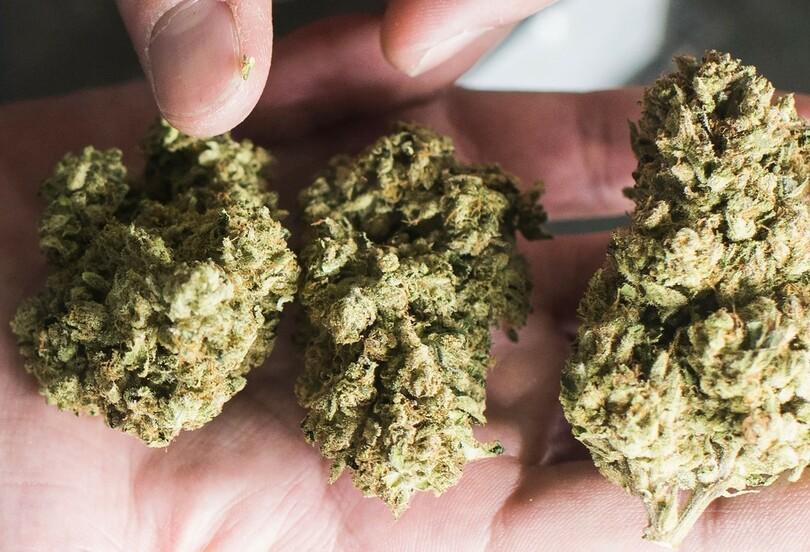In November 2016, a referendum was held in the election that coincided with the election of President Trump, and recreational marijuana was legalized in California, where I live. It is hoped that more people from other U.S. states will come to California for a "marijuana holiday." This is because many people find meaning and value in enjoying marijuana in San Francisco, the center of hippie culture.
* In addition, the possession and transfer of cannabis is prohibited under the Japanese Cannabis Control Law, and Japanese people are to be punished under Japanese law even overseas.
To be honest, there wasn't a day that I didn't feel that the things that had been banned up until now had become a mere shell. This is because walking around Berkeley, where I live, San Francisco, which is the most urbanized city in the suburbs, or the abundant natural parks in the surrounding area, I could immediately encounter the scent of marijuana. Although its use for medical purposes has been recognized, it seems to have spread beyond that.
The other day, a friend noticed that a middle school student was smoking marijuana in front of his house. She immediately called the police, who told her that she was an adult and had to take care of herself.
By the way, cannabis can be used for medical purposes over the age of 18, and for recreational use over the age of 21. Even if it's legal, using it in public places will result in a fine of around $100. It feels like they've legalized it so that the police don't have to pay the cost of cracking down on it.
Before legalization, just as there were a certain number of people enjoying marijuana on the streets, I saw that marijuana trade was also taking place on the streets. They don't seem to be particularly concerned about their surroundings, but they quickly exchange goods and money, and quickly part ways. You can tell by the atmosphere.
However, it seems that recently they are no longer exchanging money directly. This is because of the spread of person-to-person remittance applications such as Venmo and Square Cash, and the style is changing to only exchange goods on site after completing the exchange of money in advance.
However, since Venmo will leave the remittance history like a news feed if you are not careful, it seems that Apple Pay Cash, which can be remitted via iMessage introduced by Apple, is more useful as it is easier to maintain privacy. It has become. Of course, Apple wouldn't be touting it as "convenient for the marijuana trade," but...

Now, with the legalization of marijuana, a huge vivid light blue billboard has been placed in an outdoor advertisement along the Bay Bridge that crosses the bay from San Francisco to Oakland and Berkeley. came to see The advertiser is an app called Eaze.
The meaning of this word is comfort, relaxation, and comfort. It's easy to imagine it being an app for getting marijuana. It also introduces how to use it carefully even for beginners, and here it introduces the purpose of reducing stress and relieving pain for medical use.
In addition, it is used for improving creativity, immersion in music, movies and games, eating, sleeping, and sex. It is also impressive that the functional application is emphasized.
Eaze can easily order marijuana products with an app. Just like Uber Eats and EAT24, it feels like having a meal delivered to you. Once an order is placed, a driver in that area will deliver the product to the user in about 20 to 30 minutes.
The time has come to order marijuana from an app. U.S. apps already have libraries built for them to read formatted IDs such as driver's licenses. Therefore, a mechanism is adopted to confirm whether the user is over the age of 21, and if the user is under the age of 21, the application documents such as medical marijuana use documents. Personal authentication and confirmation of the area of residence have not been overlooked.
In developed countries other than Japan, research into the use of marijuana for medical purposes has progressed, and it is said that addiction symptoms are lower than caffeine. is. On the other hand, there are many areas where it has been banned for a long time. I feel uncomfortable with the speed of change in California, which has been incorporated into the sharing economy ecosystem at the same time as legalization and can be easily ordered from the app.
The Eaze website explains that marijuana is the fastest growing industry in California. In fact, the state of Oregon, which had already legalized it, has made a very large contribution to tax revenue, and is expected to exceed $1 billion in five years from 2014. Such rapid growth has created new jobs and has been derided as the "green rush."
In California, the reason why apps are delivered in conjunction with the sharing economy is that the personal possession of recreational marijuana is limited to 1 ounce (28g). In other words, if you use the app, you can make additional purchases within 30 minutes as soon as you run out, and you can accurately grasp the needs of users.
App sales seem to expand the possibilities for more people to easily access than face-to-face sales. When you think about it, you can think of it as achieving stricter legal compliance.
The change in the image of marijuana in the United States and the expansion of convenience due to mobileization are occurring at the same time, and attention is being paid to what kind of impact it will have on society in the future, but mobiles will definitely act as a social infrastructure. You can also find it in marijuana legalization.
